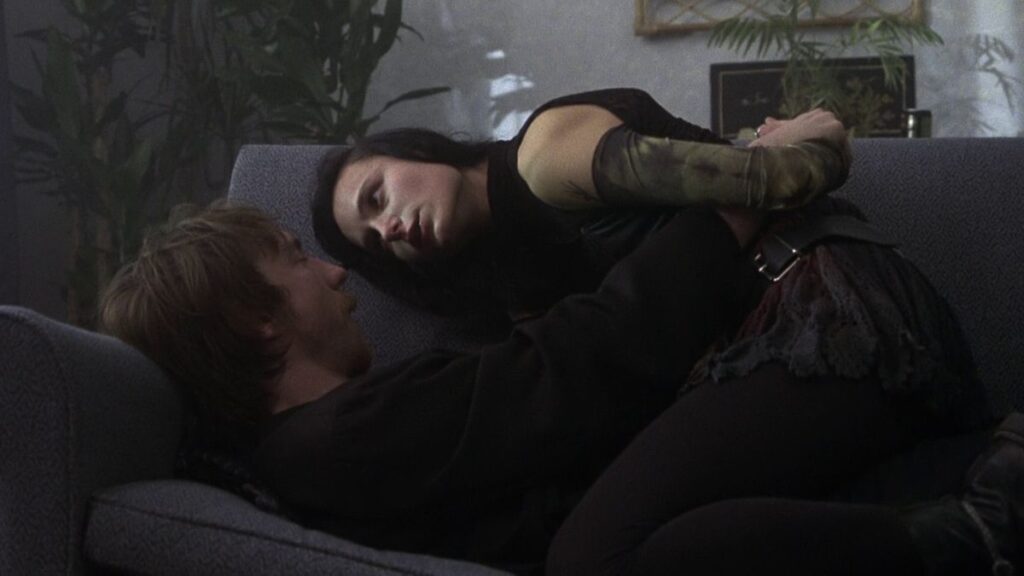
Mike Leigh’s film Naked (1993) isn’t so much concerned with the physical world of its characters, nor even its audience, but rather the spiritual world they inhabit. This assumption may seem off base since the film is so visually invested in the milieu of the locations, capturing a “real-life” authenticity that is at the heart of all of Leigh’s films. The issue of the spiritual, of the moral conflicts these characters face, exists in the dialogue and their own interactions. Each character is both destructive and constructive to the psychological well being of any character whose path they cross. Because Naked deals almost exclusively with dialogue driven interactions, this relationship of moral debate and understanding remains at the forefront of the film.
Naked opens with Johnny raping a woman in an alley. Afraid of the police, he flees to London to stay with his former lover Louise (Lesley Sharp). While there, he begins an affair with Louise’s roommate Sophie (Katrin Cartlidge). As Sophie becomes more and more infatuated with him, Johnny becomes more and more abusive, testing the limits of their relationship. Once he is through with Sophie, he ventures out into the streets, where he has a series of strange encounters with a number of different people. In Johnny’s absence, Jeremy the landlord arrives. With brute force, Jeremy turns Sophie into a sexual object. While wandering the streets, Johnny is jumped, and beaten very badly. This prompts him to return to Louise’s flat, where he confronts Jeremy. After beating Johnny, Jeremy tires of his position and abruptly leaves. In dismay, Louise, Sophie and Johnny begin to quarrel. The quarrel is too much for Johnny, who leaves Sophie again.
David Thewlis had his breakthrough in Naked playing the drifter Johnny. Johnny is one of the catalysts for confrontation, not just to the other characters in the film, but also to the spectator. Johnny firsts charms his way into the confidence and good graces of the people he encounters. Then, Johnny turns on them, arguing against everything they have exposed about themselves, pitting his anarchistic behavior against their domesticity and complacency. For instance, a security guard spies a woman through a window in the building across from his work place. The guard speculates about her life, the virtues of womanhood, the purity of true love, etc. The guard represents a bygone age, born just after WWII, raised to idolize God and country. To disprove the guard’s conceptions, Johnny steals away and seduces the woman, making sure the guard can see what is going on. At once, Johnny has corrupted the guard’s vision, both figuratively and literally. Johnny goes further, arguing that “peeping” is equatable to a kind of rape, thusly corrupting the guard’s own sense of self. This is the general mode of operations for Johnny, discrediting, disproving, and perverting the moral ideals of the people he meets.
Jeremy (Greg Cruttwell) represents the other major catalyst for confrontation in Naked. He is misogynistic to a horrifying degree, working primarily through physical action as opposed to Johnny’s verbal action. Jeremy’s extreme and cartoonish behavior recalls the villainous hoods of Derek Jarman’s Jubilee (1977) or a depraved Looney Tunes short. The sexual degradation of Jeremy’s victims (all women) offers none of the lessons or counter arguments the audience received from Johnny’s rants. Jeremy’s violence is for violence’s sake. For Mike Leigh, this kind of ruthless violence smacks of chauvinistic fascism, a theme prevalent among violent characters in all of Leigh’s works in the eighties.
Though Johnny is a despicable and selfish character, his intelligence and wit make him redeeming, if only temporarily. To aid Johnny in appearing more likable, Leigh has invented Jeremy. Both characters represent two halves of a whole, Johnny the mind, Jeremy the brawn of the masculine image. Each character has a mutual desire for destruction, internally and externally (Johnny begins to laugh to himself upon being beaten within an inch of his life, meanwhile Jeremy works as hard as he can to solicit a violent reaction from Sophie).
The most disturbing aspect of Naked isn’t so much Johnny or Jeremy, but the ambivalence Sophie and Louise show towards the actions of these men. It’s almost as if they anticipate it, and have therefore already accepted it on some level as a condition of patriarchal society. Keep in mind, all of these characters are the same age, and in turn represent a generation. Leigh’s outlook on the contemporary twenty-something in London is darker than that of the teenage youths in Meantime (1982).
Johnny and Jeremy each seem to suffer from some sort of identity crisis (Johnny is searching for his identity, Jeremy is over confident in his own), which prompts their destructive tendencies. If this behavioral pattern is applicable to the nation of England, then not only is Naked a morality tale, but a bleak prediction on Leigh’s part. Naked ends without providing its audience with a sense of direction or possibility; Leigh is too pessimistic for that.
The material that goes into these scenes isn’t invented so much as evolves out of scenarios written by Leigh. From these scenarios (about a dozen get cut before filming begins, and a dozen more when the film is edited), Leigh works with his actors, improvising much of the dialogue to scenes in character. This style of “evolved” screenwriting embeds a close relationship with reality into Naked, making both characters and circumstances believably authentic.
